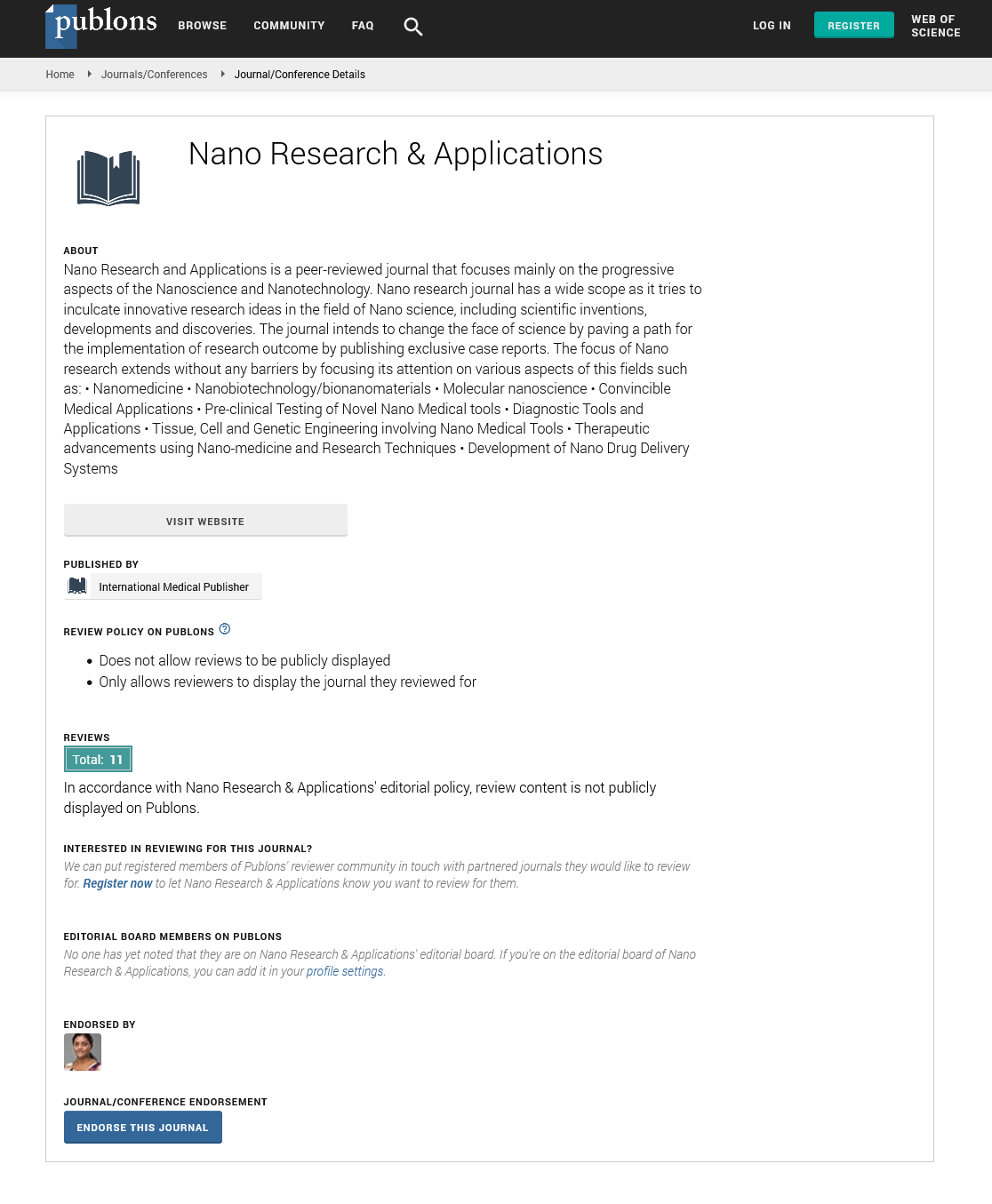ISSN : 2471-9838
Nano Research & Applications
Smart combination nanopreparations for cancer: Bringing drugs inside cells and to individual organelles
Joint Event on 25th Nano Congress for Future Advancements & 12th Edition of International Conference on Nanopharmaceutics and Advanced Drug Delivery
August 16-18, 2018 | Dublin, Ireland
Vladimir P Torchilin
CPBN - Northeastern University, USA
ScientificTracks Abstracts: Nano Res Appl
DOI: 10.21767/2471-9838-C3-014
Abstract
Tumor therapy, especially in the case of multidrug resistant cancers, could be significantly enhanced by using siRNA downregulating the production of proteins, which are involved in cancer cell resistance, such as Pgp or survivin. Even better response could be achieved is such siRNA could be delivered to tumors together with chemotherapeutic agent. This task is complicated by low stability of siRNA in biological surrounding. Thus, the delivery system should simultaneously protect siRNA from degradation. We have developed several types of lipid-core polymeric micelles based on PEG-phospholipid or PEI-phospholipid conjugates, which are biologically inert, demonstrate prolonged circulation in the blood and can firmly bind non-modified or reversibly-modified siRNA. Additionally, these nanopreparations can be loaded into their lipidic core with poorly water soluble chemotherapeutic agents, such as paclitaxel or camptothecin. In experiments with cancer cell monolayers, cancer cell 3D spheroids, and in animals with implanted tumors, it was shown that such co-loaded preparations can significantly down-regulate target proteins in cancer cells, enhance drug activity, and reverse multidrug resistance. This is illustrated by the efficient treatment of MDR (multi-drug resistance) cancer cells with combi-nations of siRNA-Pgp or siRNAsurvivin stabilized in polymeric mixed mi-celles and doxorubicin, or tariquidar (Pgp inhibitor) and paclitaxel loaded into the same lipo-some or lipid-core polymeric micelle. In order to specifically unload such nanopreparations inside tumors, we made them sensitive to local tumor-specific stimuli, such as lowered pH, hypoxia, or overexpressed certain enzymes, such as matrix metalloproteases. Using pH-, redox-conditions, hypoxia-, or MMP2-sensitive bonds between different components of nanopreparations co-loaded with siRNA and drugs, we were able to make the systems specifically delivering biologically active agents in tumors, which resulted in significantly improved therapeutic response. We have also developed approaches to target individual intracellular organelles to initiate the apoptosis in resistant cancer cells. Recent Publications 1. Zhu L et al. (2013) Enhanced anticancer activity of nanopreparation containing an MMP2-sensitive PEG-drug conjugate and cell penetrating moiety. Proceedings of National Academy of Sciences of the USA. 110(42):17047- 17052. 2. Jhaveri A, Deshpande P and Torchilin V (2014) Stimuli-sensitive nanopreparations for combination cancer therapy. Journal of Controlled Release. 190:352-370. 3. Zhu L et al. (2014) Matrix metalloproteinase 2 sensitive multifunctional polymeric micelles for tumor-specific codelivery of siRNA and hydrophobic drugs. Biomaterials. 35(13):4213-4222. 4. Torchilin V P (2014) Multifunctional, stimuli-sensitive nanoparticulate systems for drug delivery. Nature Reviews Drug Discovery. 13(11):813-827. 5. Perche F et al. (2014) Hypoxia-targeted siRNA delivery. Angewandte Chemie International Edition. 53(13):3362-3366.
Biography
Vladimir P Torchilin, PhD, DSc is a University Distinguished Professor of Pharmaceutical Sciences and Director, Center for Pharmaceutical Biotechnology and Nanomedicine of Northeastern University, Boston, USA. His interests include drug delivery and targeting, nanomedicine, multifunctional and stimuli-sensitive pharmaceutical nanocarriers, biomedical polymers, experimental cancer therapy. He has published more than 400 original papers, more than 150 reviews and book chapters, has written and edited 12 books, and holds more than 40 patents. Google Scholar shows more than 52,000 citations of his papers with H-index of 102. He is Editor in Chief of Current Drug Discovery Technologies, Drug Delivery, and OpenNano; Co Editor of Current Pharmaceutical Biotechnology and on the Editorial Boards of many other journals. He received more than $30 M from the governmental and industrial sources in research funding. He has multiple honors and awards and in 2011, Times Higher Education ranked him number 2 among Top World Scientists in Pharmacology for the period of 2000-2010.
E-mail: v.torchilin@northeastern.edu
Google Scholar citation report
Citations : 387
Nano Research & Applications received 387 citations as per Google Scholar report
Nano Research & Applications peer review process verified at publons
Abstracted/Indexed in
- Google Scholar
- China National Knowledge Infrastructure (CNKI)
- Directory of Research Journal Indexing (DRJI)
- WorldCat
- Publons
- Secret Search Engine Labs
- Euro Pub
Open Access Journals
- Aquaculture & Veterinary Science
- Chemistry & Chemical Sciences
- Clinical Sciences
- Engineering
- General Science
- Genetics & Molecular Biology
- Health Care & Nursing
- Immunology & Microbiology
- Materials Science
- Mathematics & Physics
- Medical Sciences
- Neurology & Psychiatry
- Oncology & Cancer Science
- Pharmaceutical Sciences
